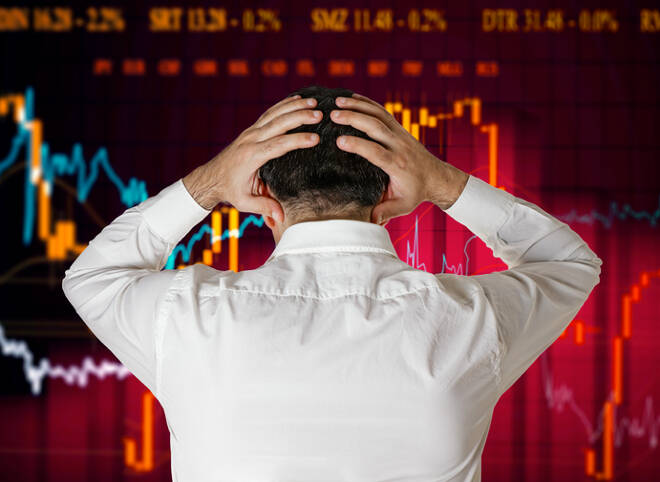Advertisement
Advertisement
Restoring Consumer Confidence Will Be Key to Global Economic Recovery
By:
The major reason why it is going to take time for the economy to recover is fear of job loss. Some companies will bounce back, some won’t survive and that will result in permanent job losses.
In the “miss a little, miss a lot” category, while most investors were watching the counter-trend and counter-intuitive rally in global equity markets last week, the International Monetary Fund (IMF) issued a dire warning about the global economy.
The rapid-rise in risky assets was partly fueled by President Donald Trump’s plan to reopen the coronavirus-battered economy and hopes of a potential flattening of the coronavirus-curve due to aggressive social distancing, frequent testing and treatment-related breakthroughs. Meanwhile, the IMF said the global economy is expected to shrink considerably in 2020.
The price action in the stock markets indicates investors are choosing optimism over reality, given that most economic reports support the notion that the global economy is already in recession. Investors are focusing on the positive, which may be good for short-term performance, but it may also be an indication that they are not fully-prepared for a second-wave of the coronavirus.
COVID-19 ‘Great Lockdown’ to Shrink Global Economy by 3% in 2020 – IMF
The global economy is expected to shrink by 3.0% during 2020 in a stunning coronavirus-driven collapse of activity that will mark the steepest downturn since the Great Depression of the 1930s, the International Monetary Fund said on Tuesday.
The IMF, it its 2020 World Economic Outlook, predicted a partial rebound in 2021, with the world economy growing at a 5.8% rate, but said its forecasts were marked by “extreme uncertainty” and that outcomes could be far worse, depending on the course of the pandemic.
“It is very likely that this year the global economy will experience its worst recession since the Great Depression, surpassing that seen during the global financial crisis a decade ago,” the IMF said in its report. “The Great Lockdown, as one might call it, is projected to shrink global growth dramatically.”
Future Uncertainty: Don’t Expect a Quick Economic Recovery
Given last week’s report that showed quarterly growth contracted significantly in the world’s second biggest economy – China – for the first time in 28 years, skyrocketing jobless numbers in the United States, and warnings from oil cartel OPEC that demand will fall to a 30-year low, many are wondering if the economy will return to normal once the coronavirus pandemic is over.
The answer is no, based on recent data showing a huge drop in consumer confidence. Analysts are saying that such factors as uncertainty over when the shutdowns will end, the resulting loss of wealth, the speed and depth of the downturn, and the risk of a new outbreak without a vaccine, will continue to weigh on people’s confidence about the economy bouncing back.
The reality is that the virus is calling the shots and until we have better clarity on the path infections take, people can’t be fully confident on where the economy is headed.
Doug Porter, Chief Economist at BMO Financial Group said, “The fact that people have been directly affected – whether through their jobs or their investments – likely makes them wary about a broader economic recovery.”
“The fact that job losses have been so widespread and affected so many people directly accentuate the impact,” Porter said.
Don’t Equate Rapid Stock Market Rally with Rapid Economic Recovery
The key takeaway from this article is that investors shouldn’t use the strong two-week recovery in the stock market as an indication of a fast rebound in the U.S. economy. Just take a look at oil prices which plunged on Monday into negative territory. That fact that producers are willing to pay buyers to take oil off their hands tells us a lot about what professionals think about demand. And that reflects how they feel about the economy recovering in a timely manner.
Even with governments offering reassurances that we will see a quick recovery in the economy once the outbreak is under control, the data suggests otherwise. While some will use the stock market’s performance as their guide, others are saying it won’t be business as usual until consumers feel comfortable eating at crowded restaurants, drinking at congested bars or shopping at a jam-packed mall. Those are the signs we should be watching.
The major reason why it is going to take time for the economy to recover is fear of job loss. Some companies will bounce back, some won’t survive and that will result in permanent job losses.
Remember when the stock market was hitting all-time highs just two months ago? Remember when the Fed said consumer spending and job gains were driving the economy?
If they were driving the growth in the economy and the stock market then it makes sense that a drop in consumer spending fueled by job losses will slow down or even prevent a full recovery.
About the Author
James Hyerczykauthor
James Hyerczyk is a U.S. based seasoned technical analyst and educator with over 40 years of experience in market analysis and trading, specializing in chart patterns and price movement. He is the author of two books on technical analysis and has a background in both futures and stock markets.
Advertisement
